Generic Medicines
Taj Pharma is the largest generic pharmaceutical company in India. We hold top positions in different established markets worldwide generics markets..
One of the most devout and insular countries in the Middle East, Saudi Arabia has emerged from being an underdeveloped desert kingdom to become one of the wealthiest nations in the region thanks to vast oil resources.
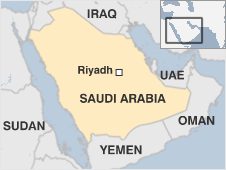 |
But its rulers face the delicate task of responding to pressure for reform while combating a growing problem of extremist violence.
Named after the ruling Al Saud family, which came to power in the 18th century, the country includes the Hijaz region - the birthplace of the Prophet Muhammad and the cradle of Islam. This fact, combined with the Al Sauds' espousal of a strict interpretation of Sunni Islam known as Wahhabism, has led it to develop a strongly religious self-identity.
AT-A-GLANCE
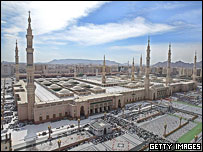 Politics: The Al Saud dynasty holds a monopoly of power; political parties are banned and the opposition is organised from abroad; militant Islamists have launched several deadly attacks
Economy: Saudi Arabia is the world's dominant oil producer and owner of the largest hydrocarbon reserves; rapidly growing unemployment is a major challenge
International: Saudi Arabia is one of the main players in the Arab and Muslim worlds; its stature is built on its geographic size, its prestige as the custodian of the birthplace of Islam and status as major oil producer
|
Saudi Arabia was established in 1932 by King Abd-al-Aziz - known as the Lion of Najd - who took over Hijaz from the Hashemite family and united the country under his family's rule. Since his death in 1953, he has been succeeded by various sons.
The Al Saud dynasty's monopoly of power meant that during the 20th century successive kings were able to concentrate on modernisation and on developing the country's role as a regional power.
It has always been in the ruling family's interests to preserve stability in the region and to clamp down on extremist elements. To this end, it welcomed the stationing of US troops in the country after Iraq's invasion of Kuwait in 1990.
But the leadership's refusal to tolerate any kind of opposition may have encouraged the growth of dissident groups such as Osama Bin Laden's al-Qaeda, which benefited from popular resentment against the role of the US in the Middle East.
After the terrorist attacks on New York and Washington of 11 September 2001 - carried out mainly by Saudi nationals - the Saudi authorities were further torn between their natural instincts to step up internal security and pressure to allow a greater degree of democracy.
In 2003 suicide bombers suspected of having links with al-Qaeda killed 35 people - including a number of foreigners - in the capital Riyadh. Some Saudis referred to the attacks as their own 9/11.
Since then, demands for political reform have increased, as has the frequency of militant attacks, some of them targeted at foreign workers. The security forces have made thousands of arrests.
Municipal elections in 2005 were a first, limited exercise in democracy. But political parties are banned - the opposition is organised from outside the country - and activists who publicly broach the subject of reform risk being jailed.
Saudi Arabia sits on more than 25% of the world's known oil reserves. It is capable of producing more than 10 million barrels per day; that figure is set to rise.
Head of state, prime minister: King Abdullah Bin-Abd-al-Aziz Al Saud
Saudi Arabia has been ruled since its foundation by the Al Saud dynasty. King Abdullah succeeded the late King Fahd, his half brother, in August 2005.
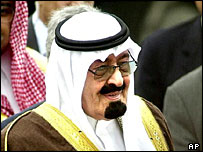
King Abdullah is seen as a cautious reformer
|
As crown prince, Abdullah had been the effective ruler of Saudi Arabia since the former king suffered a stroke in the mid-1990s.
He became heir to the throne in 1982, commanded the powerful National Guard and was considered to be the most influential figure in the country. He is a former mayor of Mecca. His son, Mutib, is deputy commander of the National Guard.
Abdullah is said to have forged alliances with other members of the ruling family to offset the influence of his seven half brothers. Known as the "Sudayri Seven", they are the most powerful alliance within the ruling family.
He is seen as being untainted by corruption - giving credibility to his drive to stamp it out - and to favour reforms which are balanced with a respect for Saudi traditions.
Regarded in the Arab world as a supporter of wider Arab interests, he has criticised US support for Israel and Israel's occupation of Palestinian territory.
King Abdullah is believed to have been born in 1924. He received a traditional religious education and is close to the Saudi tribal way of life, often spending periods of time in the desert.
Saudi Arabia, though a pioneer of pan-Arab satellite television, has long had one of the most tightly-controlled media environments in the Middle East.
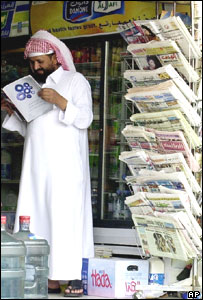
Saudi Arabia maintains tight control over the media
|
Criticism of the government and royal family and the questioning of religious tenets are not generally tolerated.
But by 2003 there were signs of increasing openness, with some formerly taboo topics receiving press and TV coverage. The September 11 attacks on the US and instances of domestic militancy were said to have brought about a bolder and more candid reporting.
The state-run Broadcasting Service of the Kingdom of Saudi Arabia (BSKSA) is responsible for all broadcasting. It operates four TV networks, including news channel al-Ikhbariya. The minister of culture and information chairs the body which oversees radio and TV operations.
Private radio and TV stations cannot operate from Saudi soil, but the country is a key market for pan-Arab satellite and pay-TV broadcasters. Saudi investors are behind some of these networks, including Dubai-based MBC and Bahrain-based Orbit. Viewers in the east can pick up TV stations from more liberal Gulf neighbours.
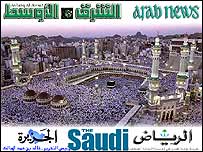 |
Saudi newspapers are created by royal decree. There are more than a dozen dailies and many magazines. Pan-Arab papers, subject to censorship, are available. Newspapers tend to follow the lead of the state-run news agency on whether or not to publish stories on sensitive subjects.
The government has invested heavily in security systems to block access to websites it deems offensive, said to range in subject matter from religion to swimwear.
There were 6.2 million internet users by March 2008 (ITU). Many surfers are said to be women, possibly a result of restrictions on their movements. There are said to be as many as 5,000 Saudi blogs.
The press
Television
Radio
News agency
Saudi Press Agency (SPA) - state-run
AFRICA | ASIA-PACIFIC | AMERICAS | EUROPE | MIDDLEEAST | SOUTHASIA
![]()
![]()
![]()
Mauritania Mauritius Morocco Mozambique Namibia Niger Nigeria Republic-of-congo Rwanda Sao-tome-and-principe Senegal Seychelles Sierra-leone Somalia South-africa Sudan Swaziland Tanzania The-gambia Togo Tunisia Uganda Australia Brunei Burma Cambodia China East-timor Fiji Indonesia Japan Kazakhstan Kiribati Kyrgyzstan Laos Malaysia Marshall-islands Micronesia Mongolia Nauru New-zealand North-korea Palau Papua-new-guinea Samoa Singapore Solomon-islands South-korea Taiwan Tajikistan Thailand The-philippines Tonga Turkmenistan Tuvalu Uzbekistan Vanuatu Vietnam Antigua-and-barbuda Belize Bolivia Brazil Canada Chile Colombia Costa-rica Cuba Dominica Dominican-republic Ecuador El-salvador Grenada Guatemala Guyana Haiti Honduras Jamaica Mexico Nicaragua St-kitts-and-nevis St-lucia Suriname Trinidad-and-tobago Uruguay Venezuela Albania Andorra Armenia Austria Azerbaijan Belarus Belgium Bosnia-hercegovina Bulgaria Croatia Cyprus Czech-republic Denmark Estonia Finland France Georgia Germany Greece Hungary Iceland Ireland Italy Latvia Liechtenstein Lithuania Luxembourg Macedonia Malta Moldova Monaco Montenegro Norway Poland Portugal Russia San-marino Serbia Slovakia Slovenia Spain Sweden Algeria Egypt Iran Iraq Israel-and-palestinian-territories Jordan Kuwait Lebanon Libya Mauritania Oman Saudi-arabia Sudan Syria Tunisia United-arab-emirates Yemen Afghanistan Bangladesh Bhutan India Nepal Pakistan Sri-Lanka The-Maldive